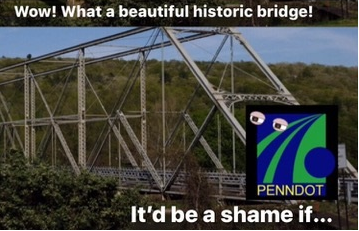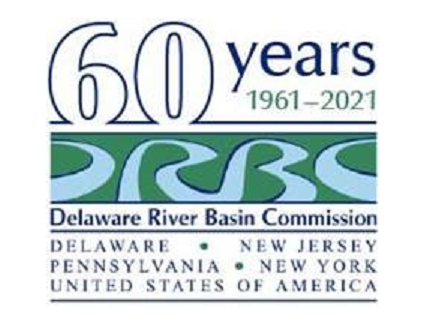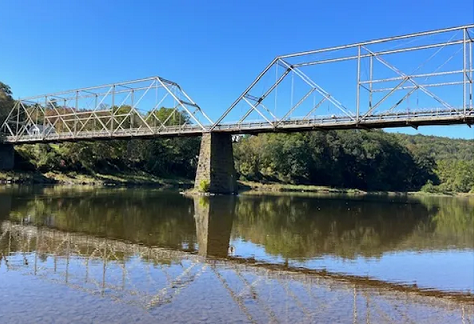UDC Says: Save the Skinners Falls Bridge!
January 8, 2022
DCS Working to Make YOUR Skinners Falls Bridge Comments Count
February 9, 2022Summary (see press release below for more information):
The deadline for submitting comments on the DRBC’s frack ban rules has been extended to February 28, 2022.
Comments can be submitted online here.
Top 10 Talking Points can be found here.
An additional public hearing has been scheduled for February 3, 2022.
Register for the hearing here.
If the hearing is “full” when you try to register, sign up for the wait list. Additional slots often open up.
For Immediate Release
January 26, 2022
Contacts:
- Tracy Carluccio, Delaware Riverkeeper Network, tracy@delawareriverkeeper.org, 215.692.2329.
- B. Arrindell, Damascus Citizens for Sustainability, Director@damascuscitizens.org
- Karen Feridun, Berks Gas Truth, berksgastruth@gmail.com, 610.678.7726
Press Statement
Coalition Welcomes Additional DRBC Public Hearing on Delaware River Frack Ban Rules
Delaware River Watershed community and advocacy organizations called for additional opportunity for input
Virtual—The Delaware River Basin Commission (DRBC) has added an additional virtual public hearing on their draft regulations concerning the import of wastewater produced by fracking and the export of water from the Delaware River Watershed for fracking outside of the Basin. The Hearing is scheduled for Thursday, February 3, 1:30 p.m. and is for those who have not spoken at a previous hearing.
Also, the virtual hearing will now be held in Spanish as well as English, which advocacy groups had championed. Those who plan to speak must sign up by 5pm on Feb. 2, the day before the Hearing here.
The DRBC website has the hearing details, including their “hearing rules”. If you have a phone, you can join the DRBC virtual hearing even if you don’t have a computer or can’t use the zoom virtual platform.
Another welcomed change is allowing submission through the regular USPS mail with an accompanying request for an exception with a person’s written comment. Mail to: Commission Secretary, DRBC, P.O. Box 7360, West Trenton, NJ 08628. Requests should explain why the commenter is unable to use the web-based system. Postal mail is readily available in communities and is inexpensive. The Coalition has argued that it is essential that equal access be afforded to all members of the public. For some people, it is the only way they will be able to submit written comments.
The Coalition still wants a better written comment process. DRBC has not provided an email for written comment submission, which restricts what is a fast and familiar means of communication for many people. The Coalition also wants more hearing opportunities. The public’s deep engagement in the highly controversial draft fracking regulations has yielded a better process than was initially set by DRBC. This illustrates that people can influence agencies and can win better public input into these monumentally important decisions that are made by the government, decisions which have far-reaching impacts on our lives and those of future generations.
BACKGROUND
Public demands for a fair public participation process were repeatedly submitted to the DRBC. The Delaware River Frack Ban Coalition submitted letters each month since the opening of the comment period advocating for an expansion of the public comment process and presented comments at the December 2021 DRBC Business Meeting for more opportunity for a broader, more diverse public to take part. A letter signed by 64 organizations in support of an expanded public participation process was submitted on December 8.
A letter from the Coalition on November 8 called for more hearings, an email and postal address for comment submissions, and other improvements including a 180 day public comment period, which was set at the time by DRBC for only 90 days from October 28 to January 28. DRBC responded by extending the comment period by one month to February 28 and some requested changes were made such as translating into Spanish the DRBC supporting documents for the draft regulations. A letter focused on improving the public hearing process to make the virtual hearings more accessible and the registration process more user-friendly was submitted January 6.
The Coalition’s Nov. 8 letter stated: “If the Commission will not make an effort to reach hard-to-reach communities in the watershed, many of which are likely to be directly impacted by the proposed wastewater imports and water exports, then it cannot say that it has conducted a proper, inclusive public participation process. This would be a good opportunity for the Commission to correct the longstanding environmental injustice of failing to ensure that all communities in the watershed are equally well-informed. Submission through the regular mail is readily available in communities and is inexpensive. For some people, it is the only way they will be able to submit written comments. It is essential that equal access be afforded to all members of the public.”
The addition of the February 3 virtual public hearing is in response to the collective efforts of a concerned and engaged public to get more comment opportunities for more people. The Hearing will be conducted in Spanish as well as English, something the Coalition pushed for. While the additional hearing is welcomed as an important opportunity, it is limited because it is only open for people who have NOT already spoken at the DRBC public hearings held in December.
Also, DRBC is sticking to its rule of requiring registration the day before the hearing, which constrains people joining at the last minute if their schedule changes. Testifying at a virtual hearing is for some people the only way they can take part due to time limitations, work and family obligations and lack of computer access.
Go here to register for the hearing
The Delaware River Frack Ban Coalition’s Top Ten Suggested Talking Points are available to help in preparing comments for the hearing.
More information, scientific reports, and references regarding aspects of the draft regulations can be downloaded here to prepare testimony and written comments.
Written comments are being accepted by DRBC through February 28 here.
The Delaware River Frack Ban Coalition Organizing Committee: Berks Gas Truth, Catskill Mountainkeeper, Clean Water Action, Damascus Citizens for Sustainability, Delaware Riverkeeper Network, Environment New Jersey, Food & Water Watch, Natural Resources Defense Council, Sierra Club, League of Women Voters of Delaware.




